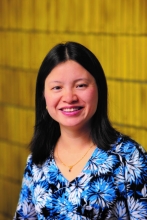ChEMS Seminar: Bioinspired Adaptive Skins

Abstract: Nature provides us fascinating examples with remarkable optical effects, including the dazzling iridescence on butterfly wings and dynamic underwater camouflage on Cephalopod skins that can change from transparency to red. Meanwhile, there have been tremendous interests in design of smart roofing, skylights, and architectural windows, which can block or reflect sunlight on scorching days, and return to a transparent state at a low lighting condition to improve light harvesting and capture free heat from the sun.
Importantly, bioorganisms respond to environmental change passively with minimal energy. Taking the cues from Nature, where fabrication of structured materials follows a bottom-up approach, I will discuss synthesis and assembly of various nanoparticle systems for angle-independent, structural color in a solution or in films. We can achieve the dramatic and reversible visual effects between three states, that is color display, opaqueness, and transparency. By coupling the materials-environment response at the nano- and microscale with CMOS technology, we demonstrate autonomous tracking/imaging/sensing ability and feedback control as the first step toward energy efficient building skins.
Biography: Shu Yang is a professor in the Departments of Materials Science & Engineering, and Chemical & Biomolecular Engineering at University of Pennsylvania, and Director of Center for Analyzing Evolved Structures as Optimized Products (AESOP): Science and Engineering for the Human Habitat. Her group is interested in synthesis, fabrication and assembly of polymers, liquid crystals, and colloids with precisely controlled size, shape, and geometry; investigating the dynamic tuning of their size and structures, and the resulting unique optical, mechanical and surface/interface properties. Yang received her B.S. degree from Fudan University, China in 1992, and Ph.D. degree in chemistry and chemical biology while researching in the Department of Materials Science and Engineering at Cornell University in 1999. She worked at Bell Laboratories, Lucent Technologies as a Member of Technical Staff before joining Penn in 2004. She received George H. Heilmeier Faculty Award for Excellence in Research from Penn Engineering (2015-2016). She is elected as Fellow of National Academy of Inventors (2014) and TR100 as one of the world’s top 100 young innovators under age of 35 by MIT's Technology Review (2004). She was a recipient of ICI (1999) and Unilever (2001) student awards from American Chemical Society (ACS) for outstanding research in polymer science and engineering.
Share
Upcoming Events
-
MSE Special Seminar: Architecting 3D Complex Materials for Sustainability
-
MSE Special Seminar: Decarbonizing Industries for a Climate-resilient Future - From Renewable Energy to Sustainable Material Recovery
-
CEE Seminar: BIM and the Digital Twin
-
MSE Special Seminar: Revolutionizing Battery Technology - Engineering Quantum Materials for Enhanced Safety and Performance in Solid Electrolytes
-
MSE Special Seminar: Designing Sustainable Soft Matter from the Molecule Up
